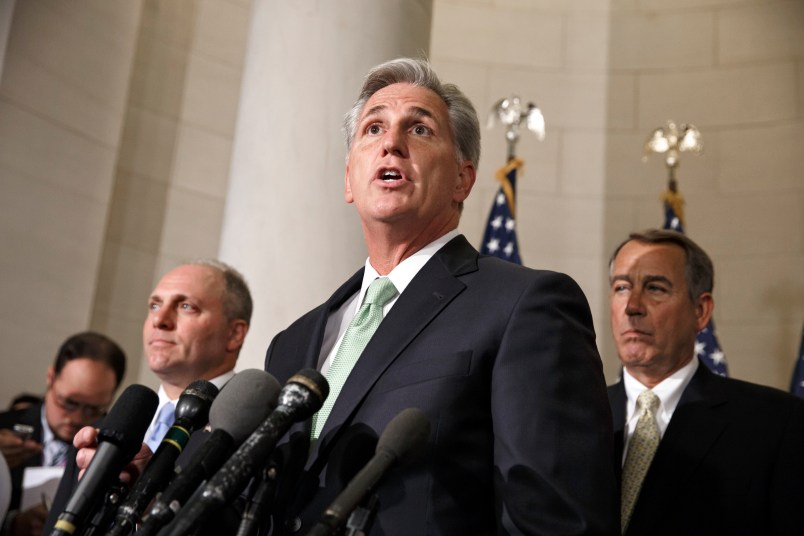If anyone doubted that the Republican Party would become more conservative after the ousting of Eric Cantor, his successor put those doubts to rest over the weekend.
In an interview with Fox News, incoming House Majority Leader Kevin McCarthy (R-CA) revealed leadership’s first significant policy shift: opposition to reauthorizing the Export-Import Bank when its current charter expires on Sept. 30, a move that would shutter the credit agency.
“One of the problems with government is it’s going to take hard earned money so others do things that the private sector can do. That’s what Ex-Im Bank does,” he said. “I think Ex-Im Bank is one that government does not have to be involved in. The private sector can do it.”
The Ex-Im Bank, first established in 1934, is tasked with boosting the exports of American goods and services through loans and guarantees. In fiscal year 2013, the Ex-Im bank supported $37.4 billion in U.S. exports and 205,000 export-related American jobs, the agency estimated.
Ex-Im has for years been a target of conservatives in and out of Congress, who view it as a bastion of corporate welfare and cronyism. It has a complicated history that touches internal House Republican fights for leadership which may have affected McCarthy’s move.
In 2012, despite right-wing opposition, Cantor helped rescue the bank in a deal with Democrats that a number of House Republicans voted against. McCarthy went along with Cantor’s deal at the time. But now things are different.
One of the most avowed opponents of the Ex-Im Bank is Rep. Jeb Hensarling (R-TX), who left the No. 4 position in GOP leadership in 2013 to chair the Financial Services Committee. Cantor, seeking to stay out of trouble with the right, had steered clear of the fight in the run-up to his June 10 primary. The business community expected him to fight for Ex-Im once he was safely reelected, but alas, he fell to tea party-backed challenger David Brat in a stunning upset.
Hensarling is no ordinary conservative troublemaker. The six-term congressman is respected by Republicans and beloved by the activist right, which has been pushing him to mount a dark-horse bid to unseat John Boehner as Speaker next year. Hensarling has remained coy about his intentions publicly, and while he resisted a push by colleagues to run for a leadership post last week, rumors on Capitol Hill are that he might mount a bid in January. That’ll ensure that Boehner and McCarthy watch their right flanks carefully over the next seven months.
McCarthy also shifted his tone on the issue of immigration reform. In January, the Californian, who hails from a district that is 35 percent Hispanic, championed “legal status that will allow [people living in the U.S. illegally] to work and pay taxes.”
On Sunday McCarthy was singing a different tune, telling Fox News that the House should do “nothing about immigration until we secure the borders.” He added: “The borders are not secure.” He didn’t specify what would constitute a secure border, leaving enough room to oppose immigration reform no matter what happens at the border.
“Until you secure the borders, you cannot have the conversation about anything else,” said the House GOP’s new No. 2, who will ascend to the post on August 1.
Another consequence of Cantor’s defeat was felt on Thursday when House Republicans catapulted Rep. Steve Scalise (R-LA), chairman of the ultraconservative Republican Study Committee, into the No. 3 position of House majority whip.
“We’re going to continue to move forward in the House as a united team,” Scalise said.







You have to wonder if the Republican taking these extreme positions is just a ruse. They cannot be oblivious to the fact that such legislation in support of these positions would it make through the Senate or survive a Presidential veto. It’s easy to take extreme positions when you know you’ll never have to follow through on them.
The shift is not so much to the right as surrounding the wagons to protect incumbent interests. Placing McCarthy in the House leader position shores up Big Oil and Big Ag in a time when both are challenged (oil on climate disruption, royalties, and non-conventional extraction; Ag on soil degradation, energy intensity, falling water tables, loss of natural services from monoculture, and quality of food supply). Both industries are involved in resource theft, but judged by very different standards. A farmer has to grow things, whereas the extractive industry just has to dig it up and separate it. For example, Ag might have more interest in resolving the immigration situation, but Big Oil uses pretty much the same technique of hybridized control with the political class fronting for the industry whether it’s Mexico, Angola or California, Immigration is not a priority. Also the groinal obsessions that drive some of the Republican base, really mean very little to these big interests, or Big Finance and Big Pharma for that matter. Rather it’s the job of the politician to come up with enough votes at election time to be able to have the privilege of serving these large interests. McCarthy is almost bullet-proof, but his invincibility is based on having one of the lowest-information voter bases in California.
Except the Ex-Im Bank requires re-authorization. Simply not taking a vote kills it regardless of the Senate or the President,
They don’t need the Senate or the President to block reauthorization of the Ex-Im Bank, or for that matter not to act on immigration reform. Ruse? Many Republicans originally may have adopted crazy talking to make the rightwing happy, but now they’re so controlled by the Tea Party that their ruse has become reality.
Cruz to Nowhere – boarding now!